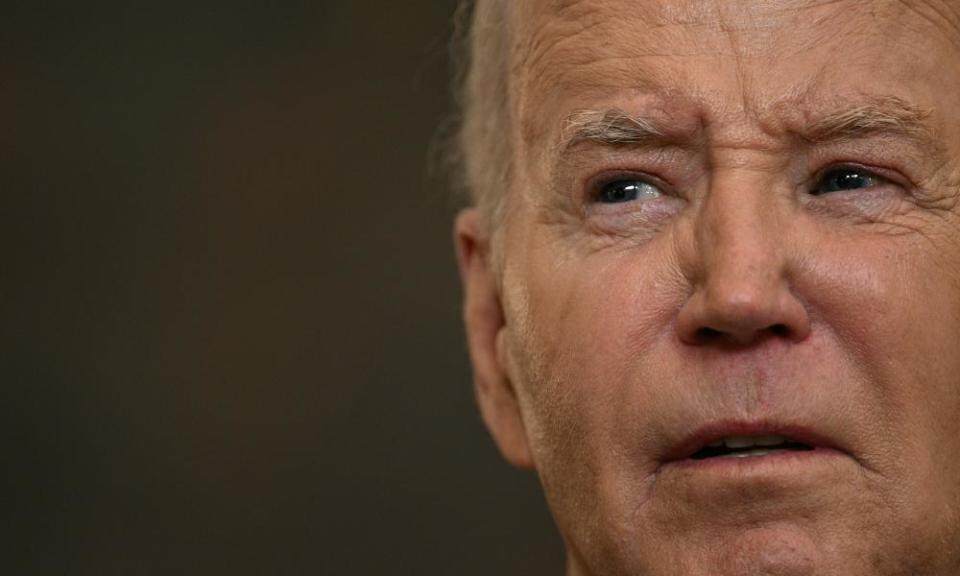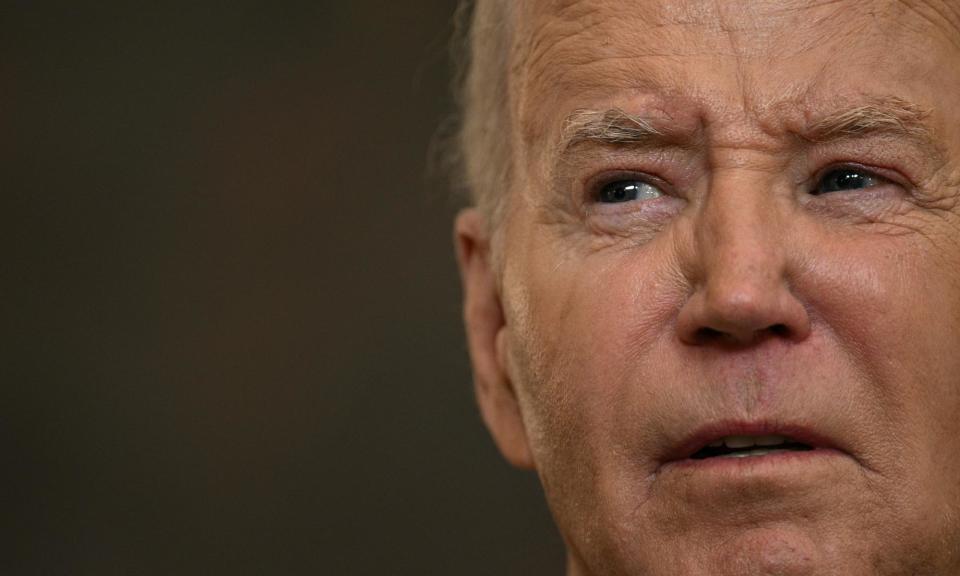Biden urges Hamas to accept Israeli plan for Gaza ceasefire: ‘Time for this war to end’
Joe Biden has urged Hamas to accept a new peace deal he said Israel has put on the table, offering a permanent ceasefire and Israeli withdrawal from Gaza in return for the release of all hostages and the long-term reconstruction of the shattered coastal strip.
“It’s time for this war to end … for the day after to begin,” Biden said, outlining the framework of a three-phase agreement, which he said had been put on the table by the Israeli government.
A senior administration official said the four-and-a-half-page proposal had been endorsed by the Israeli government of Benjamin Netanyahu and had been presented to Hamas on Friday.
Hamas issued a statement late on Friday night, saying it received Biden’s proposals “positively”.
It was unclear how enthusiastically Netanyahu had embraced the peace proposal. Biden made his remarks on the Jewish shabbat, when most Israeli politicians were offline. The prime minister’s office issued an ambiguous statement after Biden spoke, confirming Netanyahu had authorised a negotiating team to present a plan to return hostages, but insisting that Israel would keep fighting.
“The government of Israel is united in its desire to return the hostages as soon as possible and is working to achieve this goal,” the statement said. “The prime minister authorised the negotiating team to present a proposal to that end, which would also enable Israel to continue the war until all its objectives are achieved, including the destruction of Hamas’s military and governing capabilities.
“The actual proposal put forward by Israel, including the conditional transition from one phase to the next, allows Israel to uphold these principles,” the statement said.
In his remarks on Friday, Biden said the first phase of the peace plan would last for six weeks, during which there would be a ceasefire and a withdrawal of Israeli forces from all populated areas of Gaza. “A number of hostages” including women, elderly and wounded people, would be released by Hamas in return for hundreds of Palestinian prisoners being freed.
Remains of some of the dead hostages would also be returned to their families, while Gazans would be able to return to their homes across the entire strip. Crossings into Gaza would be opened, to allow in 600 truckloads of assistance a day, the quantity aid agencies have been saying is a minimum needed by the starving 2.3 million population.
Related: Humanitarian operations ‘near collapse’ in Gaza, says World Food Programme
Over the course of the first phase’s six-week ceasefire, Israel and Hamas would negotiate a second phase, aimed at a permanent end to hostilities. If the parties did not reach an agreement in the six weeks, the ceasefire would extend as long as they stayed at the negotiations, brokered by the US, Qatar and Egypt.
During the second phase, which an administration official said would also be about six weeks long, Hamas would release all remaining hostages, including male soldiers, while Israel would withdraw from all of Gaza and commit to a lasting truce subject to Hamas sticking to its side of the bargain.
“This is truly a decisive moment,” Biden said. “Israel has made their proposal. Hamas says they want a ceasefire. This deal is an opportunity to prove whether they really mean it. Hamas needs to take the deal.”
Hamas said on Thursday it had told mediators it would not take part in more negotiations while Israel continued its military operations across Gaza. A senior US official, however, argued that the new deal outlined by Biden was almost identical to the terms Hamas had been demanding, including a route to a permanent ceasefire.
The first phase of Biden’s newly announced plan was similar to a plan which had been negotiated in Qatar and Cairo for months, but had collapsed largely because of fundamental disagreement between Hamas on Israel on whether the ceasefire would be permanent.
Although the terms of the new deal were set out by Biden, he repeatedly described it as an Israeli proposal. However, he made clear he was aware there would be considerable resistance to it from the Israeli right, including the hard-right members of the governing coalition, and he addressed a substantial part of his remarks to them.
“They made it clear they want to occupy Gaza. They want to keep fighting for years, and the hostages are not a priority for them,” Biden said. But the US president argued that the Israel Defense Forces (IDF) had degraded Hamas to the point that the militant Palestinian group was no longer able to mount an attack on the scale of 7 October, a raid which killed about 1,200 Israelis.
A senior US official said the president was outlining a new proposal which Israel was able to accept because of its recent military gains.
“It is a very forward-leaning offer and I think the reason the Israelis are able to make this offer is because of some of the success they’ve had in degrading Hamas military capacity,” the official said. “I don’t think this offer would have been possible three months ago. This has been a difficult painstaking negotiation.”
The statement issued by Netanyahu’s office insisted Israel would keep fighting until the country’s aims are achieved, including “eliminating Hamas military and governance abilities”.
While Biden has sought to put political pressure on Netanyahu, the Israeli prime minister has shown repeatedly that he has some sway in US politics. On Friday, congressional leaders issued a formal invitation for him to address a joint sitting of the Senate and House of Representatives.
Earlier, relatives of hostages accused Netanyahu’s government of making “a conscious and deliberate decision to sacrifice the hostages”. “The hostages, and the entire State of Israel, have been taken captive by those who chose political interests over their national and governmental duty,” the Hostage Families Forum said in an unusually strong statement. They said their relatives had been “abandoned by the government”, and called on Israelis to “rise up, break free, and stand with us in the struggle for the soul of the nation”.
In his remarks, Biden urged Netanyahu and his war cabinet to resist rightwing opposition to peace talks.
“I’ve urged the leadership in Israel to stand behind this deal despite whatever pressure comes from the people of Israel,” the president said.
“Think of what will happen if this moment is lost?” Biden added. “Lose this moment, [and continue] an indefinite war in pursuit of an unidentified notion of total victory will only bog down Israel and Gaza, draining its economic, military and human and human resources and furthering Israel’s isolation in the world.”
He said one consequence of the deal for Israel would be a normalisation agreement with Saudi Arabia.
“Israel could be part of a regional security network to counter the threat posed by Iran,” Biden said.

 Yahoo News
Yahoo News 

